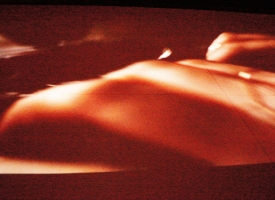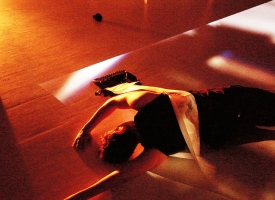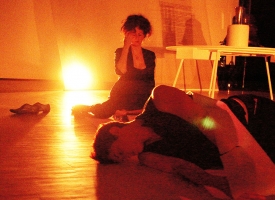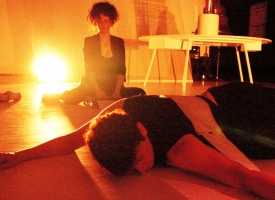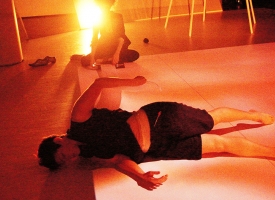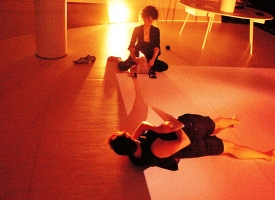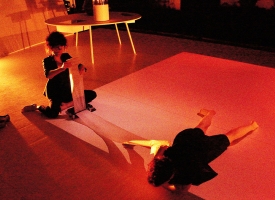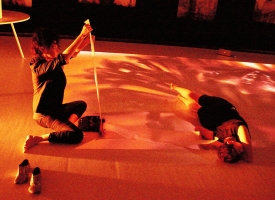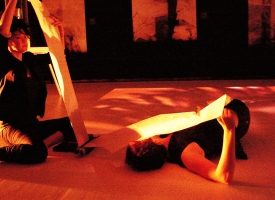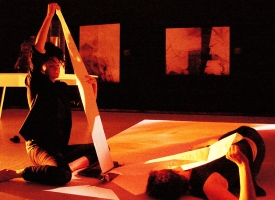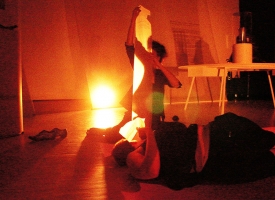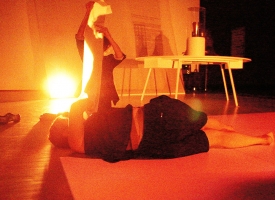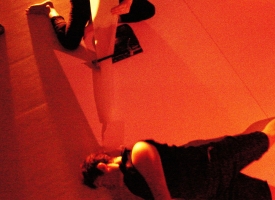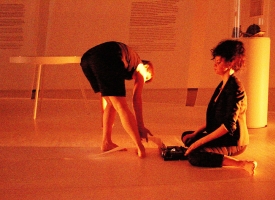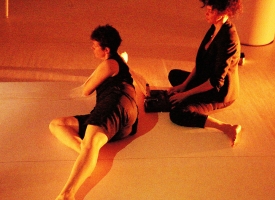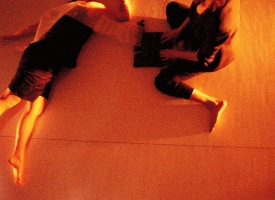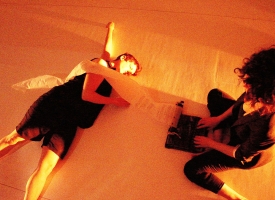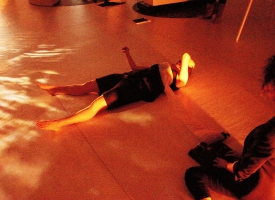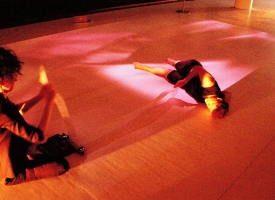Six Nights in Ignaz Günther Haus
Project Description
SIX NIGHTS IN IGNAZ GÜNTHER HAUS appears in Ugly Duckling Presse’s 2014 performance anthology Emergency Index, launched at Printed Matter’s LA Book Fair and screened on video at the Los Angeles MOCA/Geffen Museum. A suite of photographs, poems, essays, video projections, and solo and collaborative performance works, SIX NIGHTS was commissioned for performance by the Jewish Museum Munich and supported by a residency at Ebenböckhaus. The project surrounds the erotics of the post-genocidal body, and the aftermath of navigating sexuality in post-atrocity societies.
Artist Statement
Where are the erotics, the romanticization, the illicit sexuality that runs just between racism and appreciation? Attraction and repulsion, in the nether worlds of fascination. In what sites do we see something underneath, running underneath, half-illicit and unacknowledged…often in geopolitical sites of conflict, where the ideal body has waged total war against the “problematic” body. The charge remains. In Germany, it is this fascination with the Jewish female body. What is it. What does it look like when it is uncontained and unrestrained? Or, how would it feel to admit to a desire to recontain it, to restrain it, according to the instruction manuals for how to humiliate and degrade Jewish womankind? Or, who can be the one to liberate it. Celebrate it. Embrace it. Treasure it. This free girl, this free woman body: does it exist? and what does it offer, or prevent. Allow or deny. Accuse or excuse, forgive, take in. Where are its familiar pains. Its very unfamiliar pleasures.
There are a few of you left, said someone to me recently. But only a few. Mostly in New York.
What is it like, to live in a dinosaur body? The body of a type of person who has been largely destroyed. But a few remain, as though in a zoo. It’s nobody’s fault. The snow leopard, the extinct animal – it was some greedy men with guns, old hunters, who did it. And now we file our children past their cage at the zoo, and everybody stares and points, and wants to touch.
The first projects I wanted to make here in Germany, three years ago, dealt with this catastrophic collision between a 2010 Jewish female body coming into contact with 1940s Jewish female bodies. To look back not at the unreachable icons of movie posters or beauty pageant photographs but quite the contrary: stacks of dead sticks of women. Carts of pale naked skeleton women. This time, I’ve begun making what has become known in my mind as the other side, the antidote: the presence of our bodies, alive. Is it an antidote, or a mirror?
This process of questioning brought into reflection the ways in which I’m read here – wandering through Germany in a mess of unruly black hair and relationships with Jewish institutions often yields wide eyed looks of curiosity and concern, and sometimes, very often, comments about the women of Klimt, and of Egon Schiele. We like these women. They are ugly but beautiful. They are awkward and angular, but erotic. They are doomed, and yet victorious. Or…they are victorious, yet doomed. Whichever seems more romantic. More museum-worthy. Resplendent, incautious pussies, rampant on a field of imminent desire. They – or do I mean, we? – are a collision of conflicts and conundrums. Whether you like to look at them, or you look like them.
And I’ve returned to them, in lieu of other icons of erotic Jewish women. Where are we? Oh, there we are, gazing out from the masses of dark flowers, and luminous gold, and we the candlelight night women have an utterly different purpose and physiognomy from the visible-on-every-streetcorner ideal of maternal sun-and-blonde, white lace and blue eyes and an eager apron, a glass of beer with white froth in female form.
And so with this project I went into the gardens of former Nazi estates in Bavaria, with the night flowers, and the night women, and the dark creatures that speak of something different in a society dominated by the blue and the blonde…
Literature
excerpt from SIX NIGHTS IN IGNAZ GÜNTHER HOUSE
/ SECHS NÄCHTE IM IGNAZ-GÜNTHER-HAUS
translation into German by Uljana Wolf
>> excerpt from ONE / EINS
Empty glasses, no eyes behind. Lens without lashes. On my desk, your empty glasses, devoid of your ears. Der Schullehrer.
The new forgetting. Women and women and women, under the fallen stones.
Leere Brille, keine Augen drin. Linsen ohne Wimpern. Auf meinem Schreibtisch deine Brille, ohne deine Ohren. The Schoolteacher.
Das neue Vergessen. Frauen und Frauen und Frauen, unter gefallenen Steinen.
>> excerpt from FOUR / VIER
Oh God, I say. This is the kind of worrying place: the soft holes, the fingertip.
There is not a way around this. There is no avoiding.
I want you to say to me: there is you, and there is not a way to avoid you.
And I will say: a void? Yes, you’ll say, it is a void. And I’ll say, come into it.
Oh Gott, sage ich. Dies ist jene Art von Sorgenort: die sanften Löcher, Fingerspitzen.
Da gibt es kein Entkommen. Da gibt es kein Entrinnen.
Ich will, dass du zu mir sagst: Da bist du, und da gibt es um dich kein Entrinnen.
Und ich werde sagen: Kein Innen? Ja, sagst du, da ist kein Innen. Und ich werde sagen: Dann komm hinein.
>> excerpt from FIVE / FÜNF
I would like to say: here is where I come to be free. But I say to you instead: this is where I come to get clean. And you say no, this is where you come to work and I say yes, that’s what I said and you say no, this is where you come, this is where you come, this is where you come.
Ich würde gern sagen: Und dadurch werde ich zur Freiheit kommen. Aber ich sage dir stattdessen: Hier werde ich ins Reine kommen. Und du sagst, nein, hier kommst du zum Arbeiten, und ich sage ja, das habe ich gemeint, und du sagt nein, hier ist, wo du kommst, wo du kommst, wo du kommst.
Performance
Credits
SIX NIGHTS SLEEPING IN IGNAZ GÜNTHER HAUS
/SECHS NÄCHTE IM IGNAZ GÜNTHER HAUS
Desire, erotics, ecology and taboo surrounding the Jewish female body in Germany.
Concept, Text, film, photography and performance by Quintan Ana Wikswo. QuintanWikswo.com
Choreography, movement, and performance by Alexx Shilling / AlexxMakesDances.com
Music composition, spacialized field recordings, and upright bass by Arthur Kell / ArthurKell.com
Voice composed and performed by Rozalie Hirs. Translation of Wikswo’s text into German by Uljana Wolf
Supported by Creative Capital, the City of Munich, Pasinger Fabriken, Ebenböckhaus, and the Judisches Museum Munich.


